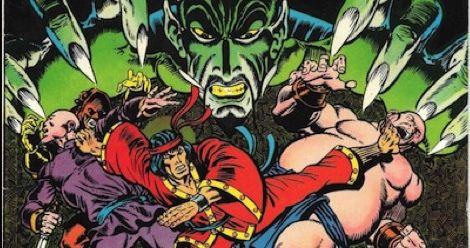
Shang-Chi, Fu Manchu, and Marvel’s Asian Problem
Recently, Deadline reported that Marvel Studios is fast-tracking a Shang-Chi movie, based on the comic book character of the same name. In an effort to recapture the lightning in a bottle that was Black Panther, they’re seeking to hire Asian and Asian American filmmakers to give it the cultural authenticity that has been lacking in their meager Asian representation thus far. They’ve already hired Chinese American screenwriter Dave Callaham for the script, and are on the hunt for a director of Asian descent.
With so many superhero movies and TV shows in the works these days, it would be easy to let this one slide by as just another project that may or may not materialize in the next decade. But I’ve been fascinated by Shang-Chi as a character for a while, and there’s a lot more going on here than bringing one of Marvel’s most prominent Asian characters to live action.
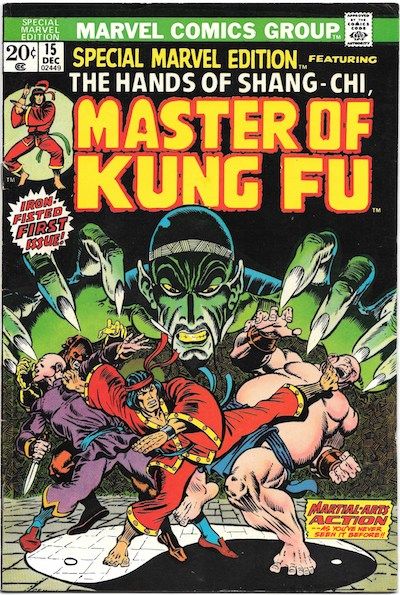
The first issue of Shang-Chi’s long-running solo series. Note the monstrous Fu Manchu behind him.
Shang-Chi was created by Steve Englehart and Jim Starlin in 1973 to capitalize on the then-current kung fu craze—in fact, Marvel’s original intention was to adapt the David Carradine show Kung Fu. When they couldn’t get the rights, they settled on Fu Manchu instead, the infamous villain created in 1913 by Sax Rohmer for a long-running series of pulp novels.
Marvel’s new hero Shang-Chi was Fu Manchu’s son, trained to be the greatest martial artist alive, who discovered to his horror that his father was actually an evil mastermind and dedicated his life to opposing him. Rounding out the cast was an assortment of characters both borrowed from the Fu Manchu franchise (notably British secret service agent Sir Nayland Smith, his associate Dr. Petrie, and Fu’s daughter Fa Lo Suee) and Marvel originals. The series, Master of Kung Fu, ran for a decade, and Shang-Chi was also prominently featured in Marvel’s black and white martial arts magazine The Deadly Hands of Kung Fu alongside similarly kung fu–based characters like Iron Fist and White Tiger.

Shang-Chi’s first appearance. He was originally designed to resemble the then recently deceased Bruce Lee.
In the mid-’80s, with the kung fu craze well past over, Shang-Chi faded from the limelight, and has appeared only sporadically since. Somewhere in there, the Marvel license to Fu Manchu and associated characters expired, but since Shang-Chi was an original creation, Marvel can still tell stories about him, as long as they don’t call his father “Fu Manchu.” It’s kind of like getting a temporary license to publish stories about James Bond’s son, Tim Bond, but then the Fleming estate takes the rights back so you can still publish the Tim Bond stories but you have to call him Tim Frond now. (Fun fact: one of the supporting characters in Master of Kung Fu, Clive Reston, is heavily implied to be both James Bond’s son and Sherlock Holmes’s grand-nephew. It’s actually super annoying in execution.)
The problem is, even though Shang-Chi is no longer canonically Fu Manchu’s son, he’s still essentially, well…Fu Manchu’s son.
I had only a vague sense of who Fu Manchu was before I stumbled down a Deadly Hands of Kung Fu rabbit hole about a year ago, since the character is thankfully no longer omnipresent, but holy crap, you guys. Here’s how Rohmer describes him in his first appearance, The Insidious Dr. Fu Manchu:
“Imagine a person, tall, lean and feline, high-shouldered, with a brow like Shakespeare and a face like Satan, a close-shaven skull, and long, magnetic eyes of the true cat-green. Invest him with all the cruel cunning of an entire Eastern race, accumulated in one giant intellect, with all the resources of science past and present, with all the resources, if you will, of a wealthy government which, however, already has denied all knowledge of his existence. Imagine that awful being, and you have a mental picture of Dr. Fu-Manchu, the yellow peril incarnate in one man.”
As long as we’re imagining, imagine reading that fully 60 years later and thinking, “Yeah, this sounds like a great franchise to get into bed with!” I mean, Rohmer allegedly created Fu Manchu when he asked his ouija board what the greatest threat to the white man was (!!!) and it spelled out “C-H-I-N-A-M-A-N.” (In another version of this story, Rohmer claimed he’d asked the board how he could make his fortune.) Come on, Marvel!
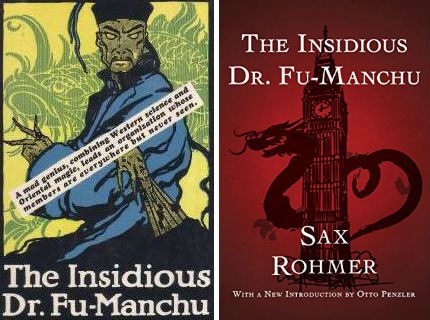
The original cover for Fu Manchu’s first appearance, and a contemporary one.
Fu Manchu, with his imperial costuming and iconic mustache, is a poisoner and a torturer, a manipulator seeking world domination. He exhorts his followers to “kill the white man and take his women” (in the 1932 film The Mask of Fu Manchu, which led to a formal complaint by the Chinese embassy), and, alongside his more fantastic plots, runs complex webs of drug trafficking and “white slavery.” Between the Elixir of Life that has made him nearly immortal and just plain Otherness, he’s usually portrayed as barely human.
And his reach extended everywhere. He starred in 14 books written by Rohmer (one posthumously) between 1913 and 1973, plus 4 authorized continuations, one published as recently as 2012. He’s been in over a dozen movies, a TV show, and several radio serials (always played by a white man), comic strips, and comic books from DC and other publishers as well as Marvel. There was even a candy called Fu Man Chews (not to be confused with the fake cereal by the same name from Nightmare on Elm Street 2).
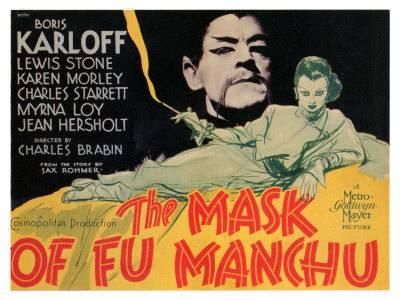
Boris Karloff and Myrna Loy donned yellowface for 1932’s The Mask of Fu Manchu.
That’s just the authorized stuff, of course. Plenty of properties have done what Marvel did after they lost the license and used the character without referring to him by name, like “the Doctor” in Alan Moore’s League of Extraordinary Gentlemen. Both the Mandarin and the Yellow Claw from other Marvel comics are Fu Manchu copies, as is Flash Gordon’s Ming the Merciless and James Bond’s Dr. No, particularly the animated version. And of course, the mustache that he eventually wound up sporting (though he was originally clean-shaven) is today known simply as a Fu Manchu.
What’s more important than Fu Manchu’s omnipresence, though, is his effect. Rohmer was writing while completely ignorant about Chinese people and culture, for an audience equally ignorant, and played on xenophobic fears to create his villain. He depicted the tiny Chinese section of London’s Limehouse district as a nest of vice when those two blocks were in fact some of the most law-abiding in the city during the World War I and interwar periods. Anti-Chinese and anti-Asian sentiment had been prevalent in the West since the late 19th century (see, for example, the Chinese Exclusion Act of 1882, which prohibited the immigration of Chinese laborers to the U.S., and the earlier Page Act of 1875, which prohibited “undesirable” immigrants but in practice mostly barred entry to Chinese women in order to prevent Chinese population growth), but Rohmer’s creation shamelessly stoked the fires of those fears, portraying the East as sinister, unknowable, and ever-encroaching.
We haven’t gotten as far away from these pulp stereotypes as we’d like to think. In 2012, both How I Met Your Mother and the children’s show Big Time Rush depicted white actors in Fu Manchu mustaches for laughs. A year later, General Motors pulled a commercial from airwaves after public outcry over its use of the mind-bogglingly racist 1938 song “Oriental Swing” and its reference to “the land of Fu Manchu.” (Content warning: that link goes to a CNN clip that also discusses car commercials featuring suicide attempts, sexual assault, and human trafficking; the song’s lyrics also contain racial slurs.)
And comic books, given their love of nostalgia, are even less removed than other genres. Just the fact that Marvel continued to use their Fu Manchu obliquely after the rights lapsed, eventually renaming him “Zheng Zu,” is proof enough, but they’re still churning out new iterations of the trope, too. Check out Charles Soule and Ron Garney’s creation Tenfingers, a Chinatown crime boss who harvests body parts for power, from a 2016 Daredevil storyline:
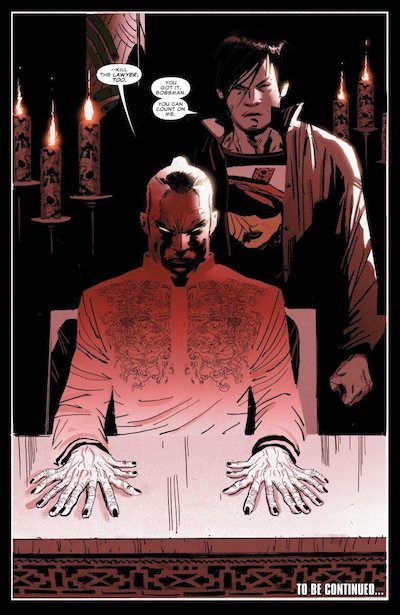
Yikes.
Which, of course, brings us to the MCU and their portrayal of Asian and Asian American characters up to now. As Asian characters are nearly completely absent from the films (an issue in its own right, of course, especially when they’re absent because they’re being played by Tilda Swinton instead), criticism has mainly focused on Marvel’s Netflix offerings, particularly Iron Fist and Daredevil. Many critics, especially those of Asian descent, have detailed the issues with Daredevil, Iron Fist, and Defenders better than I can, but the short version is: every single Asian character is a ninja; all of them are evil except for Elektra and Colleen, who start out evil but are redeemed by the love of good white men; numerous characters who speak English perfectly well don’t, in order to more effectively Other them on screen; all of these Asian characters tie into a vast immortal conspiracy to destroy New York and K’un-Lun (that is ultimately led by a white lady because of course Asian people couldn’t really have agency); Daredevil, who refuses to kill, kills the Japanese villain Nobu not once but twice and doesn’t seem to think it counts; even though all Asian characters are ninjas, they are not as good at being ninjas as white guys like Daredevil, Iron Fist, and Stick; and the Defenders writers 100% cannot tell the difference between China and Japan.
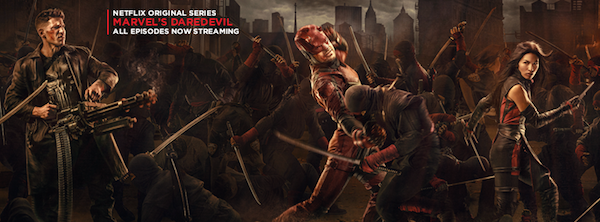
The Punisher, Daredevil, and Elektra fight a sea of faceless ninjas, clearly lethally, in this Netflix ad for Season 2.
This mindless regurgitating of stereotype after stereotype isn’t all that shocking when you consider that Marvel TV’s executive producer, Jeph Loeb, after ignoring the widespread campaign to cast an Asian American actor as Danny Rand, decided it would be a great and funny idea to show up to the Iron Fist panel at this year’s SDCC wearing a kimono. (This was apparently for a bit where he talked about Karate Kid for a bit and then Jessica Henwick, who plays Colleen, told him to take the headband and kimono off, so the joke was…that it was offensive to Asian people? Ha ha? Making Henwick play along feels especially icky.) And even though he has no control over their multimedia properties, it’s worth pointing out once more that Marvel Comics’s editor-in-chief C.B. Cebulski wrote for several years under the pen name “Akira Yoshida.”

And then there’s…whatever this is.
At best, then, we’re looking at a company obsessed with both fetishizing and vilifying the whole of East Asia—one that continually appropriates its stories, culture, artistry, and even names, but refuses to treat it or its diaspora with human dignity. Which begs the question: Is this a company that can tell a non-offensive story about Fu Manchu, even if Fu Manchu is never named as such? Can any company tell that story?
Right now it’s hard to say. On the one hand, it’s certainly a step in the right direction that Marvel has hired a Chinese American screenwriter and is planning to continue hiring Asians and Asian Americans. On the other hand, not!Fu Manchu has apparently been reimagined as a “China-based globalist,” which is about as dog whistle-y as you can get. The South China Morning Post reports that there’s already been pushback on the Chinese social media network Weibo. One user was quoted as saying: “You used Fu Manchu to insult China back in the day, now you are using Fu’s son to earn Chinese people’s money, how smart.”
Obviously China is a massive country and not every Weibo user is opposed to the film (or, presumably, even cares about it), but it will be interesting to see Marvel’s response if Chinese pushback grows. Especially since Chinese audience’s deep pockets and presumed narrow-mindedness are so often held up as an excuse for whitewashing, as with Tilda Swinton in Doctor Strange. In the face of actual feedback from China, will Marvel listen?
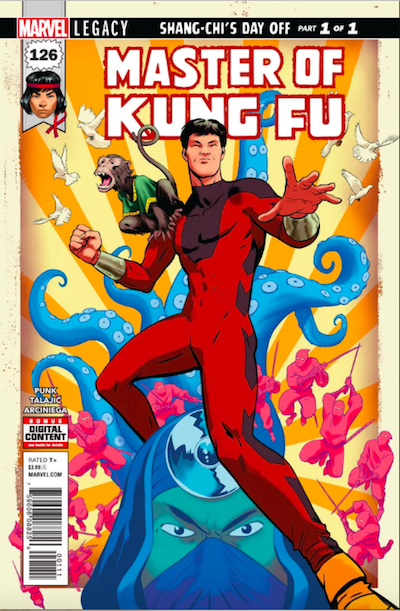
Shang-Chi in his most recent lead role. I dig his new costume.
I’ll be honest: I actually really like Shang-Chi as a character. As much as he emerged from stock Orientalist character types of the last century, I enjoy his quiet thoughtfulness, his compassion, and his subtle sense of humor. He’d be refreshingly different from the Marvel heroes we’ve been getting lately (i.e. not a variation on the Tony Stark Template), and it’s potentially a tremendous, star-making role. I plan to see the movie, if and when it releases, and I hope it’s everything to Asian audiences that Black Panther was to black audiences.
But Marvel has a lot of making up for past mistakes to do before they can get there. Let’s just hope they’re up to the task.











